SB 10.47.26: Difference between revisions
m (1 revision(s)) |
(Vanibot #0054 edit - transform synonyms into clickable links, which search similar occurrences) |
||
| (One intermediate revision by one other user not shown) | |||
| Line 1: | Line 1: | ||
{{info | {{info | ||
|speaker=Uddhava | |speaker=Uddhava | ||
|listener= | |listener=gopīs | ||
}} | }} | ||
[[Category:Srimad-Bhagavatam - Canto 10 Chapter 47]] | |||
[[Category:Bhagavatam Verses Spoken by Uddhava - Vanisource|104726]] | |||
<div style="float:left">'''[[Srimad-Bhagavatam]] - [[SB 10|Tenth Canto]] - [[SB 10.47: The Song of the Bee|Chapter 47: The Song of the Bee]]'''</div> | |||
<div style="float:right">[[File:Go-previous.png|link=SB 10.47.25]] '''[[SB 10.47.25]] - [[SB 10.47.27]]''' [[File:Go-next.png|link=SB 10.47.27]]</div> | |||
{{RandomImage}} | |||
{{SBnotice}} | |||
==== TEXT 26 ==== | ==== TEXT 26 ==== | ||
<div | <div class="verse"> | ||
diṣṭyā putrān patīn dehān | :diṣṭyā putrān patīn dehān | ||
sva-janān bhavanāni ca | :sva-janān bhavanāni ca | ||
hitvāvṛnīta yūyaṁ yat | :hitvāvṛnīta yūyaṁ yat | ||
kṛṣṇākhyaṁ puruṣaṁ param | :kṛṣṇākhyaṁ puruṣaṁ param | ||
</div> | </div> | ||
| Line 17: | Line 22: | ||
==== SYNONYMS ==== | ==== SYNONYMS ==== | ||
<div | <div class="synonyms"> | ||
''[//vanipedia.org/wiki/Special:VaniSearch?s=diṣṭyā&tab=syno_o&ds=1 diṣṭyā]'' — by good fortune; ''[//vanipedia.org/wiki/Special:VaniSearch?s=putrān&tab=syno_o&ds=1 putrān]'' — sons; ''[//vanipedia.org/wiki/Special:VaniSearch?s=patīn&tab=syno_o&ds=1 patīn]'' — husbands; ''[//vanipedia.org/wiki/Special:VaniSearch?s=dehān&tab=syno_o&ds=1 dehān]'' — bodies; ''[//vanipedia.org/wiki/Special:VaniSearch?s=sva&tab=syno_o&ds=1 sva]-[//vanipedia.org/wiki/Special:VaniSearch?s=janān&tab=syno_o&ds=1 janān]'' — relatives; ''[//vanipedia.org/wiki/Special:VaniSearch?s=bhavanāni&tab=syno_o&ds=1 bhavanāni]'' — homes; ''[//vanipedia.org/wiki/Special:VaniSearch?s=ca&tab=syno_o&ds=1 ca]'' — and; ''[//vanipedia.org/wiki/Special:VaniSearch?s=hitvā&tab=syno_o&ds=1 hitvā]'' — leaving; ''[//vanipedia.org/wiki/Special:VaniSearch?s=avṛṇīta&tab=syno_o&ds=1 avṛṇīta]'' — did choose; ''[//vanipedia.org/wiki/Special:VaniSearch?s=yūyam&tab=syno_o&ds=1 yūyam]'' — you; ''[//vanipedia.org/wiki/Special:VaniSearch?s=yat&tab=syno_o&ds=1 yat]'' — the fact that; ''[//vanipedia.org/wiki/Special:VaniSearch?s=kṛṣṇa&tab=syno_o&ds=1 kṛṣṇa]-[//vanipedia.org/wiki/Special:VaniSearch?s=ākhyam&tab=syno_o&ds=1 ākhyam]'' — named Kṛṣṇa; ''[//vanipedia.org/wiki/Special:VaniSearch?s=puruṣam&tab=syno_o&ds=1 puruṣam]'' — the male personality; ''[//vanipedia.org/wiki/Special:VaniSearch?s=param&tab=syno_o&ds=1 param]'' — supreme. | |||
</div> | </div> | ||
{{SBcollapse}} | |||
==== TRANSLATION ==== | ==== TRANSLATION ==== | ||
<div | <div class="translation"> | ||
By your great fortune you have left your sons, husbands, bodily comforts, relatives and homes in favor of the supreme male, who is known as Kṛṣṇa. | By your great fortune you have left your sons, husbands, bodily comforts, relatives and homes in favor of the supreme male, who is known as Kṛṣṇa. | ||
</div> | </div> | ||
| Line 31: | Line 36: | ||
==== PURPORT ==== | ==== PURPORT ==== | ||
<div | <div class="purport"> | ||
Śrīla Viśvanātha Cakravartī explains that the gopīs gave up their sense of possessiveness toward these objects. History shows that the gopīs remained in Vṛndāvana, living in their houses with their families. However, unlike ordinary persons, they entirely renounced the egoistical sense of possession of sons, husbands and so on. They never tried to enjoy them but rather gave their whole heart and mind to the Supreme Lord, as recommended in the great religious scriptures of the world. Following the example of the gopīs, we should love the Supreme Lord with all of our heart, soul and might. | Śrīla Viśvanātha Cakravartī explains that the ''gopīs'' gave up their sense of possessiveness toward these objects. History shows that the ''gopīs'' remained in Vṛndāvana, living in their houses with their families. However, unlike ordinary persons, they entirely renounced the egoistical sense of possession of sons, husbands and so on. They never tried to enjoy them but rather gave their whole heart and mind to the Supreme Lord, as recommended in the great religious scriptures of the world. Following the example of the ''gopīs'', we should love the Supreme Lord with all of our heart, soul and might. | ||
</div> | </div> | ||
__NOTOC__ | </div> | ||
</div> | |||
<div style="float:right">[[File:Go-previous.png|link=SB 10.47.25]] '''[[SB 10.47.25]] - [[SB 10.47.27]]''' [[File:Go-next.png|link=SB 10.47.27]]</div> | |||
__NOTOC__ | |||
__NOEDITSECTION__ | |||
Latest revision as of 19:15, 17 February 2024

A.C. Bhaktivedanta Swami Prabhupada
Please note: The synonyms, translation and purport of this verse were composed by disciples of Śrīla Prabhupāda
TEXT 26
- diṣṭyā putrān patīn dehān
- sva-janān bhavanāni ca
- hitvāvṛnīta yūyaṁ yat
- kṛṣṇākhyaṁ puruṣaṁ param
SYNONYMS
diṣṭyā — by good fortune; putrān — sons; patīn — husbands; dehān — bodies; sva-janān — relatives; bhavanāni — homes; ca — and; hitvā — leaving; avṛṇīta — did choose; yūyam — you; yat — the fact that; kṛṣṇa-ākhyam — named Kṛṣṇa; puruṣam — the male personality; param — supreme.
Translation and purport composed by disciples of Śrīla Prabhupāda
TRANSLATION
By your great fortune you have left your sons, husbands, bodily comforts, relatives and homes in favor of the supreme male, who is known as Kṛṣṇa.
PURPORT
Śrīla Viśvanātha Cakravartī explains that the gopīs gave up their sense of possessiveness toward these objects. History shows that the gopīs remained in Vṛndāvana, living in their houses with their families. However, unlike ordinary persons, they entirely renounced the egoistical sense of possession of sons, husbands and so on. They never tried to enjoy them but rather gave their whole heart and mind to the Supreme Lord, as recommended in the great religious scriptures of the world. Following the example of the gopīs, we should love the Supreme Lord with all of our heart, soul and might.